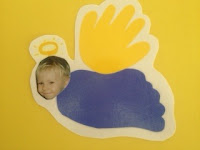PICTURE FRAME
Materials: cardboard, puzzle pieces, glue, photograph
Directions: Cut cardboard into 4” x 8” picture frames. Let children glue puzzle pieces around the edges. Tape a photo to the back.
Adaptations: Add a magnetic strip to the back so it can be hung on the refrigerator.
Decorate with buttons for mom and say “Cute as a button!”
Decorate with golf tees for dad.
Stack colored craft sticks to make a frame.
RECIPE BOOK
Materials: copy paper, construction paper, crayons, stapler
Directions: Ask each child to bring a copy of a favorite family recipe from home. (You could ask parents to send in a recipe for a special dish from their culture, a healthy snack food, a “kid friendly” dish, etc.) Have each child decorate his page with a black pen. Run off copies for each child, and then put them in a construction paper cover to make a recipe book.
Adaptation: You could also let each child dictate how to make the recipe her parents have sent in. Put her version at the bottom of the page.
GOLDEN SHOE
Materials: old shoes, gallon of school glue, old paint brush, gold spray paint
Directions: Ask each child to bring in one old shoe. Pour the school glue in a disposable container, and then let them paint the glue all over their shoe. (Inside, outside, all over!) Dry for several days on wax paper. Have children paint glue all over their shoe a second time. Dry. Spray paint gold or silver.
Adaptations: Stick a sprig of holly in the shoe or add this poem:
Here is my little shoe.
I made it just for you.
When I’m grown and tall,
you can remember me small.
BOOKMARK
Materials: burlap, felt scraps, glue
Directions: Cut burlap into 8” x 3” strips. Let children unravel ½” from all four sides. Cut flowers or other shapes from felt and glue on the burlap.
Adaptation: Children could also use plastic needles to sew yarn designs on burlap bookmarks.
LUGGAGE TAG
Materials: pipe cleaners, letter beads
Directions: Let children string beads on a pipe cleaner. (They can do initials, names, or a pattern.) Twist the ends and you’ll have a perfect bag tag.
Materials: cardstock, black felt tip pen
Directions: Cut an 8 ½ x 11” piece of paper in half. Fold in half and ask child to draw a picture of her family with a felt tip pen on the front. Open and place two pictures at a time on the copy machine. Make 5-10 copies on cardstock. Cut apart, fold, and tie with a decorative ribbon.
ORNAMENTS
Materials: 1 cup flour, 1 cup salt, ½ cup water, ornament hangars
Directions: Mix all the ingredients together to make the dough. Let the children mold the dough or flatten so it is ½” thick and cut with cookie cutters. (Use a straw to punch a hole for a hangar.) Let the dough dry for a day. Turn the dough over and dry another day. Paint with tempera paint and spray with shellac.
Adaptation: Dissolve 2 Tb. instant coffee in ½ cup hot water and add to the flour and salt. Your ornaments will look like gingerbread cookies.
Hint! Shorten drying time by baking in a 250° oven for 5-10 minutes.
SOCK SNOWMAN
























































